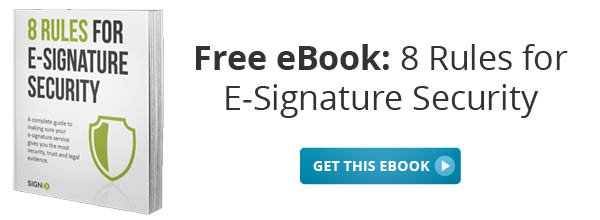When someone first learns about digital signature technology, one of their first questions is, "Are digital signatures legal?" It's an important question, and the answer is yes! More specifically, digital signatures are legal if they comply with the American Bar Association's Digital Signature Guidelines.
 Of course, you could read the guidelines yourself, but here are the six questions your e-signature vendor should be able to answer, based on the ABA guidelines.
Of course, you could read the guidelines yourself, but here are the six questions your e-signature vendor should be able to answer, based on the ABA guidelines.
Do I know who signed the document?
Digital signature services provide a variety of identity authentication options that can be tailored to fit the risk of the transaction. For instance, at SIGNiX we offer:
Email Authentication: A user is sent an email with a link to the transaction. If the user receives the email and clicks on the link, they are considered "authenticated."
Supplied Questions: This method uses information the customer (the person sending the document) knows about the signer, including account number or other information not widely known outside of the two parties' relationship.
Sponsored Pass-Through: This authentication method is for integrated partners who have already had signers login to their system. The integration proves the identity of the signer by using their existing login credentials.

Text Message Authentication: With this method, the e-signature service sends a text message with a one-time password to a signer’s mobile phone to prove they have access to a specific cell phone number.
Knowledge-Based Authentication (KBA): This authentication method asks the signers specific questions based on 30 years of information from a third-party database, which collects information about past residences, possessions and transactions. For example, signers might be asked "What city were you born in?" or "What color Toyota Camry was registered to you in New York State in 2002?"
“The SIGNiX platform establishes a trustworthy process for binding the identity of an individual to a digital signature. This is crucially important,” says Timothy Reiniger, a member of the Digital Discovery and Digital Evidence Committee of the American Bar Association
Do I know they meant to sign the document?
The e-signature service must be able to prove the signer meant to sign the document. At SIGNiX, we require signers to enter their signing PIN for each signature and initial to clearly establish this intent to sign.
The Digital Signature Guidelines of the American Bar Association say, “The affixing of the signature should be an affirmative act which serves the ceremonial and approval functions of a signature and establishes the sense of having legally consummated a transaction.”
Has there been proper disclosure and consent?
It's critical that any digital signature system be compliant with all requirements for consent for digital delivery of documents and review/approval of necessary disclosures.
At SIGNiX, you can customize our standard disclosure language to meet your unique legal and compliance requirements. Our process also requires defined steps like a review or approval of necessary documents to be completed before allowing a signature to be applied, and this consent is recorded in the document’s audit trail.
Has the document been altered?
The e-signature service must be able to prove the document hasn’t been altered. Our technology uses cryptography — hashing, encryption and PKI — to make it virtually impossible for a document to be altered without detection once the digital signature has been applied.
Read this article to learn more about tamper evidence in digitally signed documents.
Is the document accessible to all signers?
The ABA requires that documents are accessible to all signers involved in the transaction. In addition, different regulations and industries require documents to be valid for many years.
SIGNiX provides a verifiable version of each signed document and audit trail to customers and signers for storage, under their own best practices. SIGNiX can also provide permanent online access to documents for all individuals who have signed the document or have been given review rights.
Finally, SIGNiX-signed documents are rendered using the international standard PDF format, meaning documents will be accessible for many years to come.
Can I prove that the signature follows all of these rules?
A detailed audit trail of a digital transaction, including facts like the time and date of each relevant activity, gives details that paper transactions can’t provide. SIGNiX timestamps each signature and tracks all aspects of the digital signing process. SIGNiX provides independent verification of all aspects necessary for non-repudiation of the transaction.
With these questions in mind, you can be sure your signed documents will stand up to legal scrutiny, not just today, but decades into the future.
%20formatted-1.png?width=2528&height=739&name=SIGNiX%20Logo%20Main%20(white)%20formatted-1.png)

